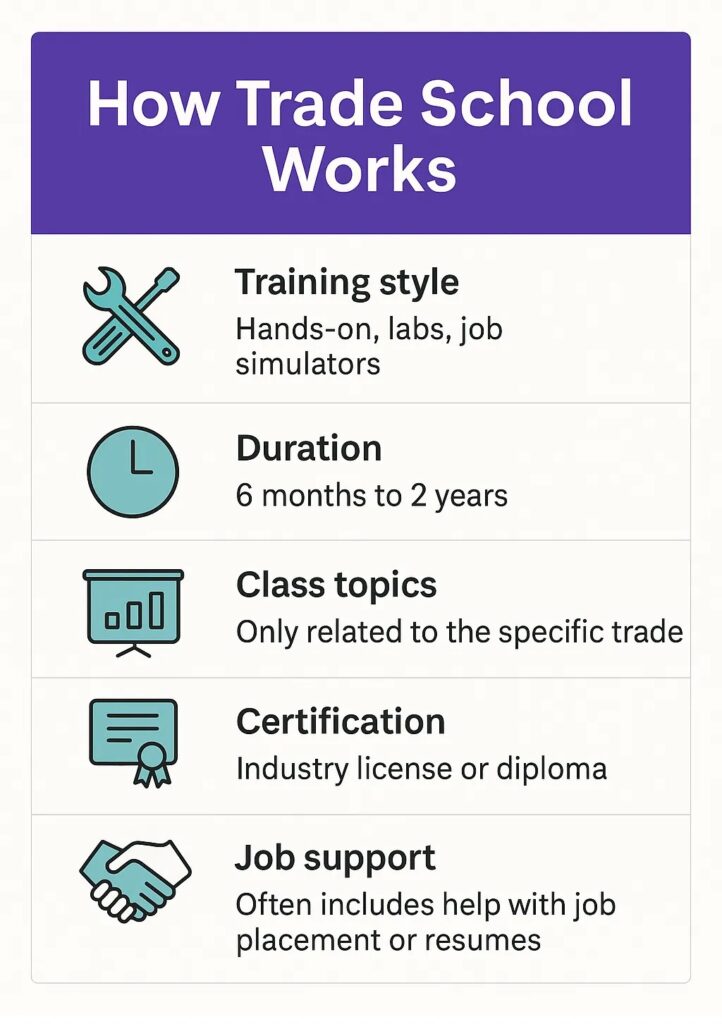What is a trade school? A trade school, also called a vocational or technical school, is a postsecondary institution that teaches hands-on skills for specific careers—like welding, HVAC, culinary arts, or dental hygiene. Unlike colleges, trade schools focus on job-ready training instead of general education.
Here’s the deal: trade schools focus on teaching you real-world skills—the kind employers are actively hiring for. We’re talking HVAC repair, electrical work, welding, medical assisting, plumbing, dental hygiene… all those essential jobs you don’t need a bachelor’s degree to land.
In fact, more and more people are turning to trade schools as a faster, more practical way to build a career.
Quick Fact: According to the U.S. Department of Education, skilled trades are among the fastest-growing job sectors in the U.S. — and many require less than 2 years of training.
This post breaks down what trade school actually is, how it works, how it compares to college, and whether it’s really worth it in 2025 and beyond.
In my opinion? If you want to skip the student loan drama and get to work doing something hands-on, trade school is a seriously underrated option.
At WholeSyllabus, we’re focused on helping students explore all learning paths—from academic to career-ready. Explore our full guide library here.
What Is a Trade School and How Does It Work?
Well, you have learnt it now.
In short: Trade schools teach you how to do the job — not just talk about it.
Let’s see how it works:

Focused Curriculum
Trade schools cut to the chase. You won’t be writing long essays on Shakespeare unless you’re applying to become a stage technician. Most programs are laser-focused on technical skills and certifications related to one career.
Shorter Duration
Most trade programs take anywhere from 6 months to 2 years, depending on the field. You could literally be job-ready in under a year. That’s huge.
Hands-On Learning
Expect a mix of classroom learning and labs, simulators, or real equipment. Some programs even include apprenticeships or externships with local businesses.
Job Placement Support
Many trade schools have partnerships with employers. It’s not unusual to finish your training and already have interviews lined up.
An insight from a Reddit user
“My brother went to trade school for HVAC. The school had this mini house setup where they taught him how to install ducts and fix cooling systems. Within 9 months, he was already working and earning more than me — and I’m still paying off college loans.”
— u/droppoutandproud, r/bluecollarwork
What Can You Learn in Trade School?
Honestly? A lot more than most people think.
Trade schools aren’t just for mechanics and electricians (though those are solid career paths). These programs cover a wide range of hands-on careers that are in high demand — and often pay surprisingly well.
Here’s a quick breakdown of what you can learn:
Skilled Trades (The Classics)
If you like working with your hands or solving mechanical problems, these might be your zone:
- Electrician
- Plumber
- HVAC technician
- Welder
- Carpenter
- Auto mechanic
Fun fact: The Bureau of Labor Statistics projects thousands of new jobs in these trades every year — and many offer apprenticeships that pay while you train. Source → bls.gov
Health-Related Programs
Yes, you can work in the medical field without going to medical school.
Trade schools offer programs like:
- Dental assistant
- Medical assistant
- Phlebotomist
- Radiologic technician
- Licensed Practical Nurse (LPN)
These roles are essential, in-demand, and usually come with job security and good benefits.
Creative & Service-Based Careers
Not everyone wants to wire a building or draw blood — and that’s fine.
Some trade programs focus on creative or customer-facing fields:
- Culinary arts
- Cosmetology
- Massage therapy
- Fashion design
- Digital media or graphic design
Here’s what most parents miss: Creative trade paths like culinary or digital arts can be just as stable as blue-collar jobs — especially with certifications and internships built into the program.
Real-Life Example:
“I didn’t want to be stuck in college for four years, so I chose dental hygiene at a trade school. In two years, I got licensed, landed a clinic job, and now earn more than my friends with degrees. Plus, zero student debt.”
— Answer on Quora
Table: Top Trade School Career Paths & Average Salaries
| Career | Avg. Salary (USD) | Program Length |
|---|---|---|
| Electrician | $60,240 | 9–12 months |
| Dental Hygienist | $78,000 | 18–24 months |
| HVAC Technician | $51,390 | 9–18 months |
| Cosmetologist | $35,000+ | 9–12 months |
| Culinary Professional | $40,000+ | 6–12 months |
📌 Note: Salary depends on experience + location. Data from bls.gov
How Is Trade School Different from College?
If you’re wondering whether trade school is better than college… well, the answer totally depends on your goals. But let’s break it down in a way that’s actually useful — not just some generic pros and cons list.
1. Focused vs. Fluffed-Out Curriculum
In trade school, you’re not spending two semesters writing essays about European history if you’re training to be a dental assistant. You jump straight into learning the skills you’ll actually use on the job.
In contrast, college requires general education courses (think math, literature, history, even PE) — whether they relate to your major or not. That’s four years of mixed content, and often only the final year is job-specific.
2. Faster Graduation = Faster Paycheck
Trade schools usually take 6 months to 2 years. Many grads are working full-time (with benefits!) while their college friends are still figuring out how to finish their senior thesis.
In my opinion, this is the biggest perk. If you want to start working now, trade school saves you years — and earns you money sooner.
3. Lower Cost = Less (or No) Debt
On average, a bachelor’s degree can cost $40,000–$120,000+ depending on the school. Trade schools? You’re usually looking at $5,000–$15,000 total — and many students graduate debt-free thanks to shorter programs and financial aid.
Here’s what most students miss: It’s not just about how much you make. It’s also about how little you owe after graduating.
Comparison: Trade School vs. College
| Feature | Trade School | College (4-Year) |
|---|---|---|
| Duration | 6 months – 2 years | 4+ years |
| Focus | Job-specific skills | Broad academics + major courses |
| Cost (average) | $5,000 – $15,000 total | $40,000+ total |
| Classes | Hands-on, lab-based | Lecture-heavy, theory-based |
| General Education | None or minimal | Required (2+ years) |
| Career Readiness | Immediate entry into workforce | Delayed, often requires internships |
| Earnings Potential | Varies, can start at $40–80K/year | Varies by major |
| Debt Risk | Lower | Higher |
TL;DR?
If you’re someone who prefers doing over studying — and you want to get to work sooner rather than later — trade school could be a better fit than college.
Is Trade School Worth It? Let’s Talk Numbers and Real Life
Short answer? For many people — absolutely, yes.
If you’re the kind of student who wants to start earning sooner, avoid massive student loan debt, and work with your hands, trade school might be one of the smartest financial decisions you’ll ever make.
Let’s break it down.
1. Trade Schools Cost Way Less Than College
While a 4-year college degree can run you $40,000 to $100,000+, trade school programs typically cost $5,000 to $15,000 total — sometimes even less with grants or state-funded options.
And since most programs last 6–18 months, you’re not just saving money — you’re also saving years of your life.
In many cases, students graduate with little to no debt, especially if they qualify for financial aid or complete a paid apprenticeship.
2. Starting Salaries Are Surprisingly Solid
Skilled trades aren’t just a “backup plan.” Some of these careers pay very competitive wages, especially considering the low training cost.
Here’s a look at a few:
| Trade Career | Avg. Salary (U.S.) | Training Time |
|---|---|---|
| HVAC Technician | $50,590/year | 9–12 months |
| Electrician | $60,240/year | 1–2 years + apprenticeship |
| Welder | $47,540/year | ~9 months |
| Dental Hygienist | $81,400/year | ~2 years |
| Elevator Installer | $88,540/year | 4 years + paid training |
Source: U.S. Bureau of Labor Statistics
Now compare that to someone with a general college degree making $40K and paying off $80K in loans.
Real People Are Making It Work (Without Debt)
“I dropped out of college, went to a welding trade school, and now make $30/hour with no debt. I work 4 days a week and spend weekends fishing or fixing bikes. No regrets.”
— u/toolsandtorches, via r/BlueCollarWork
Stories like this are everywhere. You’ll find them on Reddit, Quora, and trade school forums — people who ditched the traditional path and found success (and sanity) in the trades.
Here’s another quote from Quora:
“At 25, I was job-hopping with a useless degree. Now, I’m a licensed electrician, making more than most of my college friends. Trade school wasn’t just cheaper—it saved my future.”
— Daniel R., Quora
TL;DR — Is Trade School Worth It?
If you’re aiming for decent pay, job stability, and less debt, trade school absolutely delivers. It’s not a shortcut — it’s a smart, focused path that works for a ton of students.
In my opinion? If I were 18 again and knew what I know now, I’d at least visit a trade school before signing up for four years of lectures and debt.
Conclusion: Is Trade School Right for You?
So, is trade school the right move?
Well — if you’re the kind of person who likes to work with your hands, sees value in learning practical skills, or wants to start earning without drowning in debt, then yeah… trade school might be a very smart choice.
It’s ideal for:
- Hands-on learners who don’t want to sit through years of theory
- Career-focused students who want a direct path to employment
- Budget-conscious families who don’t want the $40K+ college price tag
Let’s be honest — traditional college isn’t the only “respectable” path anymore. In fact, a lot of trade school grads start making money faster than many college grads… and with a lot less stress.
In my opinion? If you’ve ever thought, “I just want to learn something useful and get to work”, trade school is worth looking into.
What to Do Next
Start exploring programs near you. Look into what trade schools offer in your area — or check out national programs that offer housing and job placement.
Checklist: “Is Trade School Right for Me?”
| ✅ Question | Your Answer |
|---|---|
| Do I prefer hands-on learning over textbooks? | [ ] Yes [ ] No |
| Do I want to avoid massive student debt? | [ ] Yes [ ] No |
| Am I ready to work in 6–18 months? | [ ] Yes [ ] No |
| Do I want a stable career in skilled trades? | [ ] Yes [ ] No |
| Would I rather train for a job than sit in lectures? | [ ] Yes [ ] No |
If you checked “Yes” more than 3 times, it’s time to seriously consider trade school.
Trade schools are just one of many education paths students can take after high school. If you’re weighing all your options, here’s a breakdown of public vs private vs homeschool to help you decide what’s best during K–12.
FAQs On Trade School
1. What do you do in trade school?
In trade school, students spend most of their time doing hands-on training — think welding in a workshop, running diagnostics on engines, or practicing dental hygiene on mannequins. It’s not about lectures and essays; you’re building job skills that match what you’d actually do on the job. Many programs simulate real job environments or include externships with partner companies.
Example: In an HVAC program, students might practice repairing air conditioning units in a mock apartment setup, not just read about it.
2. What is the highest paying job in trade school?
Radiation therapists, elevator technicians, and air traffic controllers often top the trade school salary lists. Many of these roles pay over $70,000 per year, and some don’t even require a degree — just certification and state licensing.
Look for trades with licensing paths, union support, and regional demand. Elevator installers, for example, earn $80K+ with only a diploma and apprenticeship.
3. What jobs can you get from trade school?
Trade school grads often land jobs like electrician, plumber, diesel mechanic, surgical tech, or dental hygienist. Some roles — like wind turbine technician — are fast-growing and high paying.
Browse your local community college’s trade catalog — it’ll show what jobs are hiring regionally. Many schools even help with job placement.
4. Is trade school cheaper than college?
Yes — most trade programs cost $3,000 to $15,000 total, compared to $100,000+ for a four-year degree. Plus, you graduate faster and start earning sooner.
Example: A 12-month electrician program might cost $8,500 — but you could start earning $25/hr immediately after licensing.
We have comparison table above.
5. Are you paid in trade school?
You’re not typically paid to attend trade school, but many programs include paid apprenticeships — especially in union-backed trades like carpentry, plumbing, or HVAC.
Ask if the school offers “earn while you learn” programs. Apprenticeships often pay $15–$25/hour and count toward certification.
Start by checking programs in your area or explore national options that offer job placement help. You never know — your future career could be just a few months of training away.
Ready to explore your options? Check out our guide to the best trades to go to school for—including high-demand careers, expected salaries, and training requirements.
Need help choosing a program? Drop your questions in the comments or reach out — I’d be happy to help.

Nawab, an educator with a decade of K-12 teaching, holds an English honors graduate degree and a diploma in elementary education. He has also been blogging for five years, sharing insights for educators and parents.

